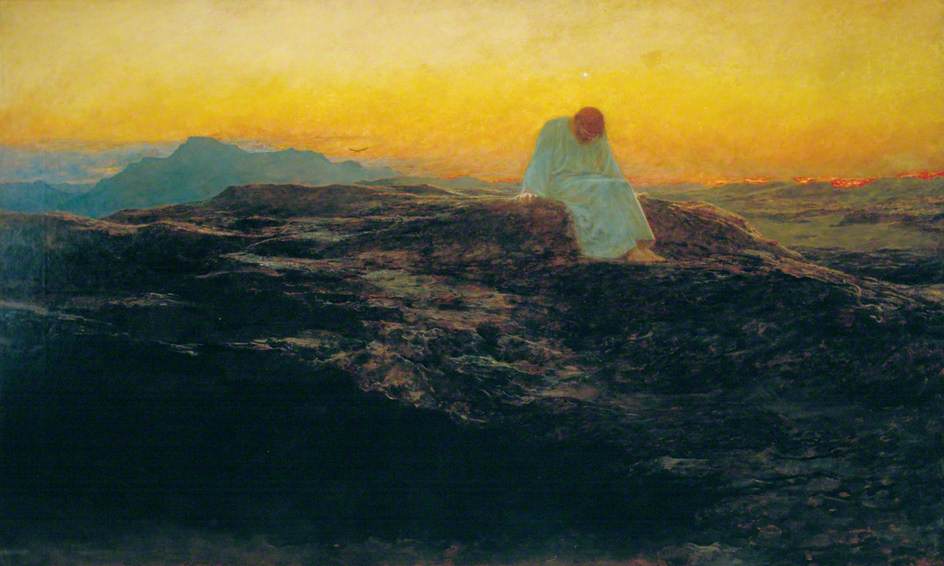 |
| The Temptation in the Wilderness by Briton Rivière |
Almsgiving, prayer and fasting are the traditional focus for Lent. Lent is a spiritual bootcamp that mirrors Jesus' time of 40 days in the desert. This mortification makes no sense in itself, but rather its goal is a preparation for Easter, and growing closer in your relationship with God. It's about love.
People grasp the concept when it comes to romantic love. In (Everything I Do) I Do It for You, Bryan Adams sings of the depths of his love:
Look into your heart,That sacrifice for love has a theological name, kenosis. It's beautifully expressed in Philippians 2:5-8:
You will find
There's nothin' there to hide
Take me as I am,
Take my life
I would give it all, I would sacrifice
Have among yourselves the same attitude that is also yours in Christ Jesus,But for us fallen human beings, there are traps and temptations along the way. We can become too focused on the externals. We can become too focused on the sacrifice and the giving of alms and prayer. We can think that perhaps we have earned God's love and entry into heaven.
Who, though he was in the form of God,
did not regard equality with God something to be grasped.
Rather, he emptied himself,
taking the form of a slave,
coming in human likeness;
and found human in appearance,
he humbled himself,
becoming obedient to death,
even death on a cross.
There is nothing we can do to earn God's love. The good news is that God's love for us is already present. Before we came to be, God loved us. Thomas a Kempis moves into this paradox of our unworthiness and God's unremitting love for us:
Trusting in Your goodness and great mercy, O Lord, I come as one sick to the Healer, as one hungry and thirsty to the Fountain of life, as one in need to the King of heaven, a servant to his Lord, a creature to his Creator, a soul in desolation to my gentle Comforter.And Scripture is clear, it is not the sacrifice that God wants:
But whence is this to me, that You should come to me? Who am I that You should offer Yourself to me? How dares the sinner to appear in Your presence, and You, how do You condescend to come to the sinner? You know Your servant, and You know that he has nothing good in him that You should grant him this.
I confess, therefore, my unworthiness. I acknowledge Your goodness. I praise Your mercy, and give thanks for Your immense love.
For you take no delight in sacrifice;And so this is the real movement, the interior movement of the heart. Many people reduce Christianity to an ethical philosophy or a moral rulebook. But that misses the heart of Christianity, a lived relationship with God Almighty.
were I to give a burnt offering, you would not be pleased.
The sacrifice acceptable to God is a broken spirit;
a broken and contrite heart, O God, you wilt not despise.
(Psalm 51:16-17)
And so how did I do? How did my plan for Lent go? Some parts went according to plan and some didn't. Perhaps I moved an inch closer to God. or perhaps a millimeter. More importantly, it was a turn toward God; I was able to examine my heart with greater clarity, for by God's grace, a light was shone on it. I chastised my heart.
For what does God want, if He "take[s] no delight in sacrifice"? Last night, on Holy Thursday, I went to church with The Imitation of Christ by Thomas a Kempis. I stayed afterwards an hour with Jesus in the Blessed Sacrament. And I opened the book, and prompted by grace, I turned the pages to the following:
Christ:
As I willingly offered Myself to God My Father, for thy sins, with My hands stretched out upon the cross, and My body naked, so that nothing remained in Me which was not turned into a sacrifice to appease the divine wrath:
Even so must thou willingly offer thyself to Me daily in the Mass, for a pure and holy oblation, together with all thy powers and affections, as intimately as thou art able.
What do I require more of thee, than that thou endeavor to resign thyself entirely to Me?
Whatsoever thou givest besides thyself I regard not; for I seek not thy gift, but thyself.





